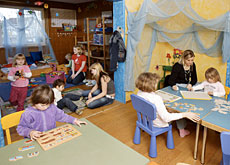Cabinet backs childcare voucher system

The Swiss government plans to support a childcare voucher scheme to help parents reconcile work and family life, according to the interior minister.
Pascal Couchepin announced the authorities were prepared to back a series of pilot projects over the next three years that should give parents much-needed flexibility when paying for childcare services.
“Child daycare options should be adapted to the needs of the parents,” Couchepin told journalists on Thursday at his annual media outing to St Peter’s Island on Lake Biel.
Young families in Switzerland face a testing time. Many struggle with inflexible working hours and arrangements, alongside high costs and a severe shortage of nursery places.
Parents should be able to use the proposed vouchers to choose the day-care service which best suits their needs. In the past the authorities generally financed crèche facilities directly.
The government hopes that a flexible financing scheme based on demand will stimulate competition and encourage the creation of institutions more suitable for people with irregular working hours.
Shortage of nursery places
It is estimated that 50,000 places are still needed based on an average of two days attendance a week at a crèche. The situation is not expected to improve, as by 2015 demand is likely to increase by 21 per cent.
Although a government programme has encouraged the creation of nursery places – 13,400 additional ones between 2003 and 2006 – there is still a shortage. Specialists say that high costs and overregulation have meant that new childcare services are slow to open.
In October 2006 parliament took a further step to address the shortage, approving a SFr120-million ($100 million) credit for the creation of childcare places over the next four years. The new voucher scheme will be financed from the new credit, the interior ministry announced.
The funds will cover 30 per cent of the pilot project costs, with the remainder coming from the cantons and local communities.
But Couchepin admitted that childcare in Switzerland was often an organisational problem rather than a financial one.
“It’s foreseeable that the credit for the nursery incentive programmes will not be used up,” he said.
Fine-tuning
Many other details of the voucher system are still to be hammered out, however.
The authorities are examining three possible models, which vary according to parents’ levels of income and activity.
According to Ludwig Gärtner, deputy director of the Federal Social Insurance Office, it’s still unclear whether parents will actually have to contribute financially.
A feasibility study will be launched in 2008, he said, with the first projects starting the following year. So far the city of Lucerne has expressed an interest in taking part.
For Couchepin, the new proposal fits perfectly with the theme of his day on Lake Biel devoted to “time policy”.
“Rather than being a money problem, the middle-classes suffer from a lack of time,” he explained to journalists.
swissinfo with agencies
1,837,000 women worked in Switzerland in the second quarter of 2006
This figure was 2,214,000 for men.
56% of women worked part-time, 12% of men.
8.4% of women worked on call, 4.8% of men.
Maternity benefit was anchored in the Swiss constitution in 1945. But voters rejected compulsory paid maternity leave on four occasions – in 1974, 1984, 1987 and 1999. It finally passed at the ballot box in September 2004 with a 55.4% majority.
As of July 1, 2005, all women working in Switzerland qualify for a minimum of 14 weeks’ maternity leave, at 80 per cent of their normal salary.
Paternity leave is not governed by Swiss legislation and is left to the discretion of the father’s employer. On average, Swiss companies grant new fathers between one and three days’ paid leave.
The government announced on Thursday that from 2008 paternity leave for federal civil servants would be increased from two to five days.
The plan by the government to support a childcare voucher scheme has been welcomed by three of the four parties in the government – the centre-left Social Democrats, the centre-right Christian Democrats and the centre-right Radicals.
But they all claim the idea was theirs.
The rightwing Swiss People’s Party rejected the plan, arguing that it benefited those parents who went to work to the detriment of those who stayed at home to educate their children. Party spokesman Roman Jäggi described the plan as a “totally wrong family policy”.

In compliance with the JTI standards
More: SWI swissinfo.ch certified by the Journalism Trust Initiative











You can find an overview of ongoing debates with our journalists here . Please join us!
If you want to start a conversation about a topic raised in this article or want to report factual errors, email us at english@swissinfo.ch.